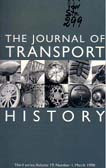The Journal of Transport History 
Leicester. University College of Leicester
Semestrale
ISSN: 0022-5266
Conservata in: Università degli Studi di Firenze, Biblioteca di Scienze Sociali
Punto di servizio: Economia; Riv. str. 0299
Consistenza: v. 1, 1953, 1-
Lacune: III ser., v . 21; III ser., 1980, 2;
[2030-2021 ] [ 2020-2011 ] [ 2010-2001 ] [ 2000-1991 ] [ 1990-1981 ] [ 1980-1971 ] [ 1970-1961 ] [ 1960-1953 ]

EDITORIAL
Massimo Moraglio, Transport history: a niche moving toward the mainstream?, p. 345
RESEARCH PAPERS
Seth Epstein, ?Wanna get married??: The taxi driver transportation network at the marriage mill of Elkton, Maryland, 19131941, p. 346
Emma Robertson, ?The girl conductor has come to stay?: Gender and labour on the buses in interwar Australia, p. 368
Olha Martynyuk, Threatening mobility: Cycling during World War II from a Ukrainian perspective, p. 389
Jacob Harris, ?Car, car over all, it has taken a terrible hold of us?: Experiencing automobility in interwar Britain and Germany, p. 411
Constantin Ardeleanu, ?Commercial and political needs demand the establishment of a Black Sea port?: Infrastructure development, opportunities and anxieties in an Eastern European periphery (1860s1870s), p. 436
Csaba Sándor Horváth, Old railways, new borders. The impact of treaty of Trianon on Western Transdanubia network (19181924), p. 457
PANORAMA
Julia Winterson, Hidden from history: Carriage cleaners in the United Kingdom from 1849 to COVID-19, p. 483
Book Reviews, p. 501
EDITORIAL
Martin Emanuel, Daniel Normark, (Un)equal footing: Otherings and orderings of urban mobility, p. 165182
PANORAMA
Tauri Tuvikene, Between traffic and walking discourse: Pedestrians in the traffic machine, hints from the Estonian case, p. 183200
RESEARCH PAPERS
Martin Emanuel, Pavement publics in late nineteenth-century Stockholm, p. 201232
Cédric Feriel, Rethinking the dominant modernist planning narrative: Investigating pedestrianisation in Europe, 1960s1970s, p. 233253
Tiina Männistö-Funk, , The struggle over pedestrians: Defining the problems of walking in the 1960s and 1970s, p. 254275
Tom Breen, Abbi Flint, Clare Hickman, Glen O?Hara, Whose right to roam? Contesting access to England?s countryside, p. 276307
Alexei Kraikovski, Small-scale shipping and the maritime commerce of eighteenth-century St. Petersburg, p. 308329
Book Reviews, p. 330
RESEARCH PAPERS
Peter Hobbins, Emulating the ?pucker factor?: Faith, fidelity and flight simulation in Australia, 193658, p. 326
Benjamin B. Cohen, ?The water flows under the bridge and we pass above it
? infrastructure, transport and state power: The bridges of Hyderabad city, India c. sixteenth to twentieth centuries, p. 2749
Tal Alon-Mozes, The landscape of Route 854 in Israel’s Galilee: Integrating nature, construction, and art in the service of a national project
Efrat Hildesheim, p. 5078
Thomas Pettersson, Johan Jansson, Urban Lindgren, A barrier to sustainable transports? Path dependence and the Swedish tax deduction for commuting
, p. 7998
Yuqing Zhu, Railroad investment and regional disparity: Public expenditure on transport infrastructure in France, 183757, p. 99124
PANORAMA
Tamires Saccharine Lico, Andreza Vellasco Gomes, Nicolle Oliveira Rocha, Eduardo Romero de Oliveira, The growth of a research field: A systematic analysis of Brazilian theses and dissertations on railways (19742020), p. 125151
Book Reviews, p. 152
EDITORIAL
Mike Esbester, Editorial: A fundamental threat to our field, p. 351
SURVEY AND SPECULATION
Nathalie Roseau, Mobile cultures and the Anthropocene, p. 354
RESEARCH PAPERS
James J. Ward, The motorcycle as identity construct and performance affect: Three real-life examples for whom transport alone was not enough, p. 368
Justin Shapiro, Environmental control: charting a course for the Navajo reservation through road construction, 1945-1978, p. 391
Malcolm Abbott, Maintaining aircraft manufacturing through government purchases: Australia and Canada from the end of the Second World War until the 1970s, p. 414
Martin Eriksson, To the mutual benefit of the member states. Nordic transnational road cooperation, 1956-1966, p. 440
Andrew Thomas Park, Europe’s disintegrative moment: Transportation and borders in Silesia during the Paris Peace Conference of 1919, p. 461
PANORAMA
Antonio Santamaría García, Reviewing Latin American railway historiography: New trends and research avenues, p. 479
Book Reviews, p. 503
Reviewer list, p. 514
EDITORIAL
Massimo Moraglio, Transport history methodology: New trends and perspectives, p. 169
RESEARCH PAPERS
Govind Gopakumar, Placing automobility in postcolonial cities: Towards an ontology of a displaced past, p. 172
Thomas Spain, David A. Turner, Food for thought: Transport within the food supply chain, p. 194
Colin Pooley, Spotlight on the traveller: Individual experiences of routine journeys, p. 214
Zef Segal, The naturalisation of nineteenth-century German Railways as depicted in visual discourse, p. 232
SURVEY AND SPECULATION
Giovanni Favero, Michael-W. Serruys, Miki Sugiura, A new place for transport in urban network theory: The urban logistic network, p. 256
Daniel Normark, Ontologies on collision course: Collaborative mobility v. managerial transport in the contemporary history of intelligent transport systems, p. 277
James Fowler, Historical Institutionalism, Hybridity and Institutional Logics in Public Transport History, p. 296
Hugo Silveira Pereira, Photography and transport history: a speculative approach to a theoretical framework, p. 312
Book Reviews, p. 333
EDITORIAL
James Cohen, Contributions to the post-World War II History of High-Speed Ground Transport in the United States, p. 3
RESEARCH PAPERS
Albert J. Churella, Private agendas and the public good: The contested development of high-speed passenger rail transport in the United States, p. 11
David Reinecke, Moonshots to Nowhere? The Metroliner and Failed High-Speed Rail in the United States, 1962-1977, p. 33
Jonathan Michael Feldman, High-speed rail and barriers to innovation: The Budd Company and the limits of US indirect industrial policy in the 1960s and 1970s, p. 54
James K. Cohen, Development of a futuristic technology programme: How the aerospace industry (almost) transformed ground transportation in the United States (1960-1972), p. 82
Jonathan English, Getting Off Track: the Northeast Corridor Improvement Project in an International Context, p. 107
Melanie Bassett, Negotiating Mobility: Royal Dockyard Workers as Railway Excursion Agents and Social Entrepreneurs, 1880-1918, p. 131
Book Reviews, p. 152
